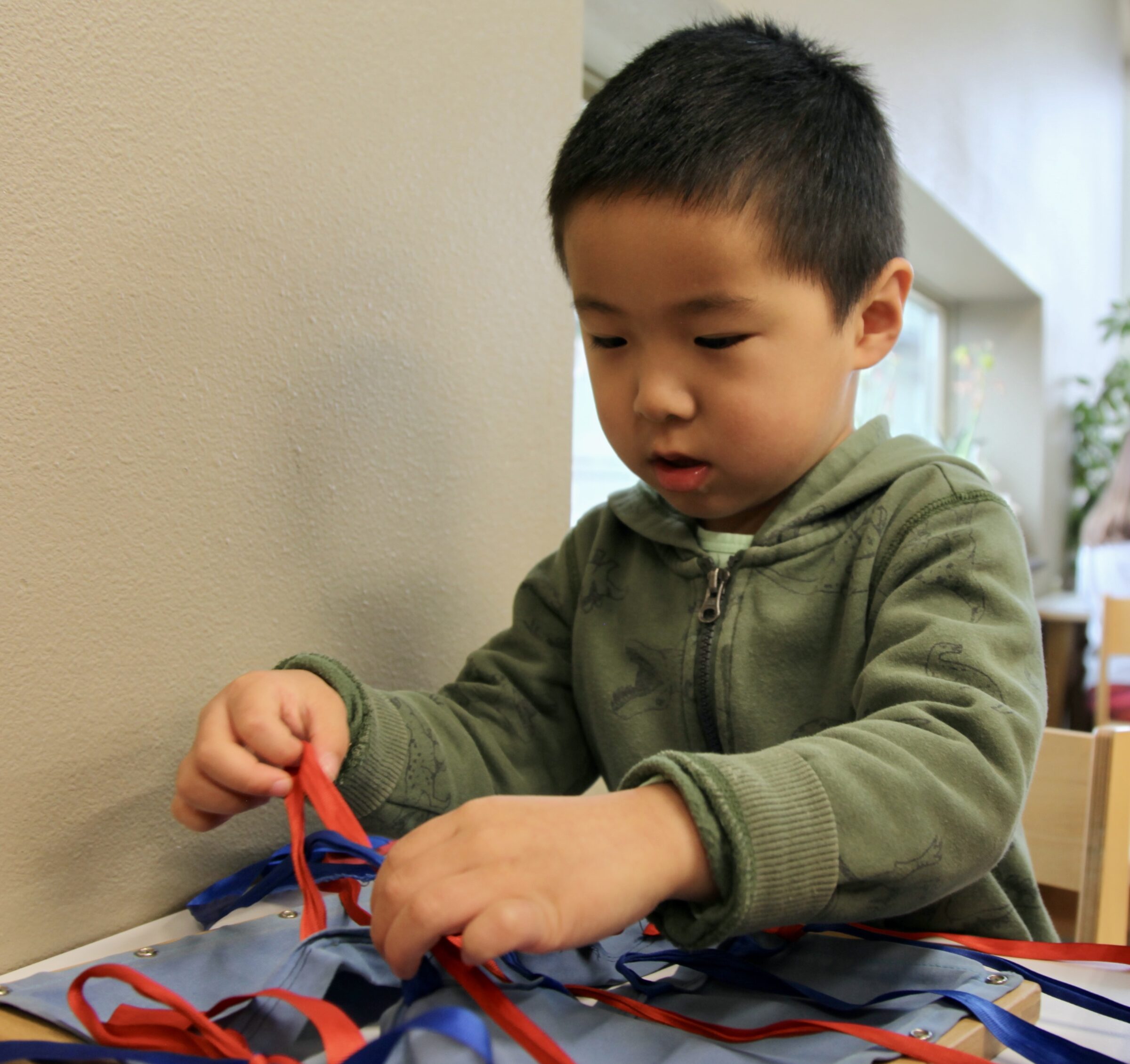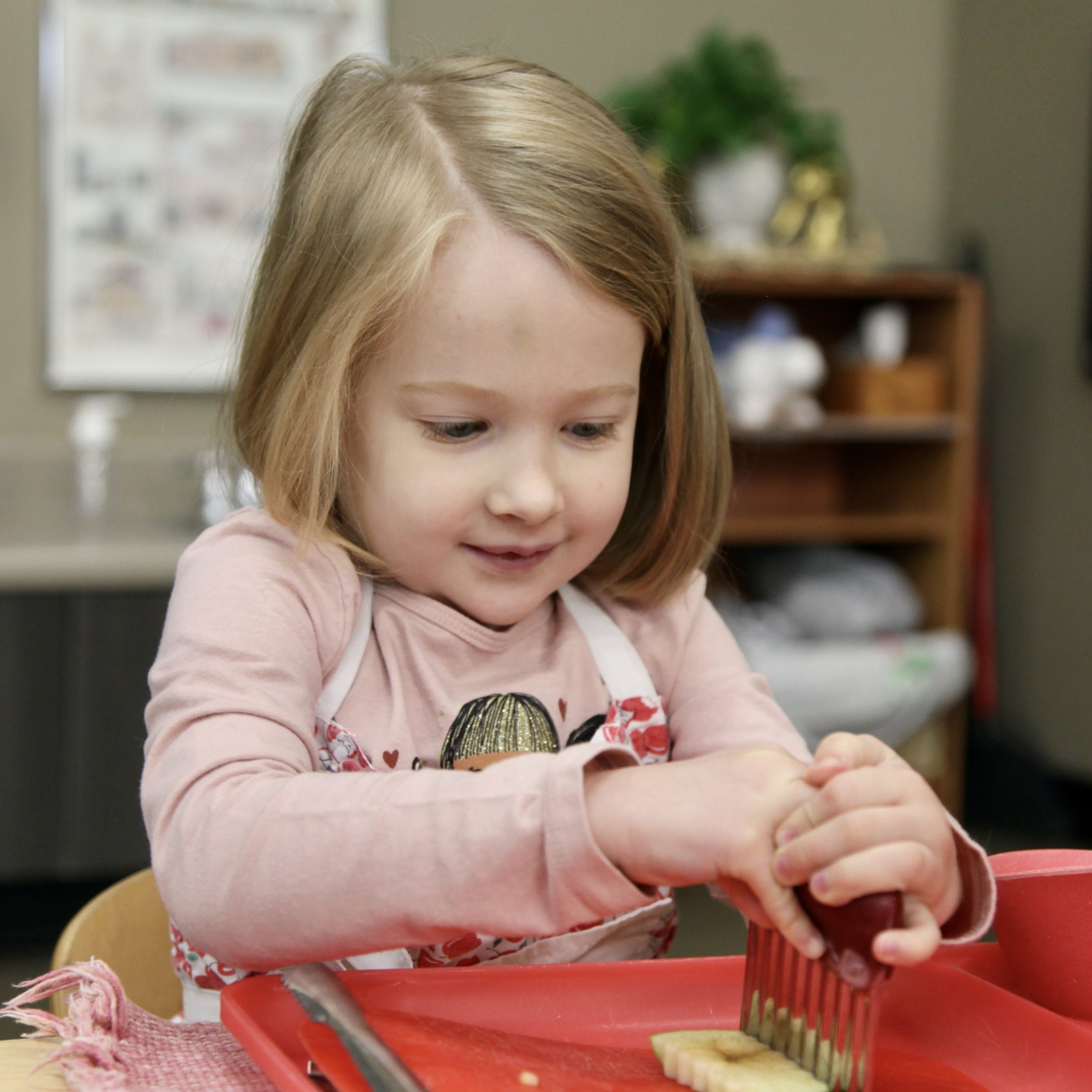One Small Change
Podcasts
For a podcast of this post, scroll to the bottom of this page or subscribe on iTunes.
All of a sudden, the school year is right around the corner. There’s something really wonderful about the back to school season, even when you’re no longer in school. The changing seasons, the chance to reset, it’s like spring cleaning or January 1st, what new chances will emerge with this change?
It’s so easy to set goals, to focus on this being the best year ever. We’re never going to be late, or forget a lunch, or get to school and realize we don’t have shoes. Not this year!
While some of us can be successful with a huge overhaul like this, many of us do better with small, incremental changes.
As the adults, we’re not quite magic, but if we create a strong scaffolding, children can thrive. We don’t need to organize our children, we organize ourselves, and the pieces will fall into place. It’s that magic of a Montessori Prepared Environment.
Habits are how we do just about everything, and we can stack the deck in our favor with small changes. There are so many books and resources about habits. Atomic Habits by James Clear, and Better Than Before by Gretchen Rubin are great places to start, if you’d like to learn more. Both are manageable, thoughtful introductions to habits, with a lot of simple suggestions, no matter if you’re in the Complete Overhaul Camp, or the Maybe A Small Improvement Or Two Side.
While any milestone — a birthday, the new year, back to school — brings a natural opportunity and sometimes desire to start new, this year, try something little, just one small change.

So often, we fall into a “if you give a mouse a cookie” moment. If you put your cup in the sink, you’ll notice the dishes are dirty, and you’ll feel crabby at your spouse for not washing them, or even worse at yourself for forgetting you said you’d wash them. If you start to wash the dishes, you’ll remember you wanted to start a load of laundry. When you start a load of laundry, you’ll empty your child’s pockets, and you’ll find some Legos. When you go to put the Legos away, you’ll remember you wanted to reorganize the toy area. When you start to take items off the shelf, you’ll find oh wait we’re late again.
So much of the time this happens because of habits, the habit of putting a cup in the sink instead of directly into the dishwasher. The habit of packing a lunch in the morning (which turns into picking up something from the gas station because we ran out of time/realized we don’t have groceries for lunch/forgot our lunch on the kitchen counter where it was beautifully packed) rather than the night before. The habit of fighting over clothing choices, and the fight carrying into crabby emotions throughout the day. The habit of always being late.
We all have one area that’s especially challenging. While we can so easily see all our failings, all the areas we need to improve, let’s be as gentle with ourselves as we are with our children. What’s one thing that’s challenging every day, or has the greatest impact, or seems the most manageable in the scheme of everything else that needs to happen?
Let’s look at the three examples mentioned above. Maybe they’re totally foreign, but maybe they’re all too familiar. They sure are common!
One — Packing a Lunch
When we identify the challenge, we can also come up with an appropriate helpful response. Is it hard to remember to bring the packed lunch? How about a sticky on the steering wheel or at adult-height, somewhere you’ll remember when you can still do something about it? When you go to pack a lunch, are there no groceries to put in the lunch? Could dinner be set aside and put directly in the lunch box, without a second thought? Are there strong opinions about lunch and when you ask what a child would like in their lunch all you hear is “something good?” Could those same strong opinions go with you to the grocery store to help select a fruit, a vegetable, a protein, and a grain for this week, or whatever your family agreement is? Is simply purchasing lunch at school an option, easier, and the best solution?
The right solution emerges only when the real problem is discovered.
Two — Clothing
This challenge is rather convenient at the start of the school year, since summer often means more time at home to re-organize, or sometimes purchasing new clothes since the last time you had to wear “real clothes” was several months and inches ago.
Maybe it’s a challenge to simply get dressed in the morning. In this case, could a child get out of bed and immediately get dressed, before even brushing teeth or anything? Maybe it’s a challenge to choose what to wear, in which case could clothing be picked the night before, or even on Sunday for the week ahead? We had one story shared with us of a family that looked at the forecast and picked clothing, right down to socks and underwear, for the whole week and tucked them in a set of five plastic drawers, available at any big-box store, so they were ready to go for the whole week! If this seems rather daunting (and, well, remember: we’re focusing on one small change), try just picking out tomorrow’s outfit and closing the closet door. We’re not always able to make our best decisions when we’re not quite awake and breakfast hasn’t kicked in yet.
Many of us wear the same “formula” day after day, and children are often the same! Often, arguments emerge when we as adults try to push against this, encouraging wearing a wider variety of colors or styles, often of our own preference rather than a child’s. We forget, it’s okay to have opinions!
“As the adults, we’re not quite magic, but if we create a strong scaffolding, children can thrive.”
It’s also okay to have rules and expectations. Since adults are the ones making the decisions of what to bring into the home and what even to purchase, we can avoid arguments down the road with decisions at the start.
Maybe the challenge comes in asking a child to wear something that isn’t their favorite. Does your child have a formula they prefer? Maybe it’s all pink, or “soft pants” and a tee shirt, or always wanting to wear their favorites. If so, are you comfortable with letting your child wear this formula most of the time? Often our conflicts at home come from concerns about outside perceptions, such as worrying about others’ comments about matching or wearing similar clothing day after day.
Here’s a secret: most parents are so concerned with their own struggles that they hardly even notice someone else’s child! Most educators are impressed that parents encourage individuality or choose not to fight about a favorite color. We’re often worried others are talking about us, when in fact there’s nothing to worry about! A child doesn’t learn better or act more kindly when their clothes are matching or when they’re wearing a certain color. This is definitely one of those “lean in” moments. Maybe the change here is to drop the rope and let this worry go.
Three — Timeliness
Often timeliness is related to one of two things: arguments stemming from one of the first two areas, clothing and food, or thinking we have time to do one more thing. We’re so busy, we think a bit like the “if you give a mouse a cookie” mindset referenced above, and we find ourselves panicked, is that the time???!
If timeliness isn’t addressed with small changes to packing a lunch or clothing, what is it related to? Maybe it’s playtime or watching a show in the morning, in which case could there be limits placed here? Maybe it’s very well-intentioned, such as wanting to let children sleep in a bit, which leads to being late for school, and they’re playing catch-up throughout the day, and then not fully tired at bedtime and wanting to spend just a bit more time together, and then having a later bedtime, which leads to needing more sleep in the morning, and the cycle begins again. In this case, could bedtime be a constant in the schedule, as well as an alarm in the morning? Maybe we’re late because we think we have more time than we do. In this case, an alarm for ten minutes before we need to be in the car or at the bus stop can really be helpful in getting everyone out the door in a timely manner, and setting the day off on the right foot.
Every family is unique, so maybe none of these challenges fit! In that case, perhaps they helped spark ideas for one small change that would benefit your specific challenges. Maybe they all sound familiar! In that case, please, resist the urge to address all these areas at once. What’s going to have the biggest payoff? What’s going to be the greatest benefit? Start there, start from success.
Happy New Year!
Written by:
Charlotte Snyder




